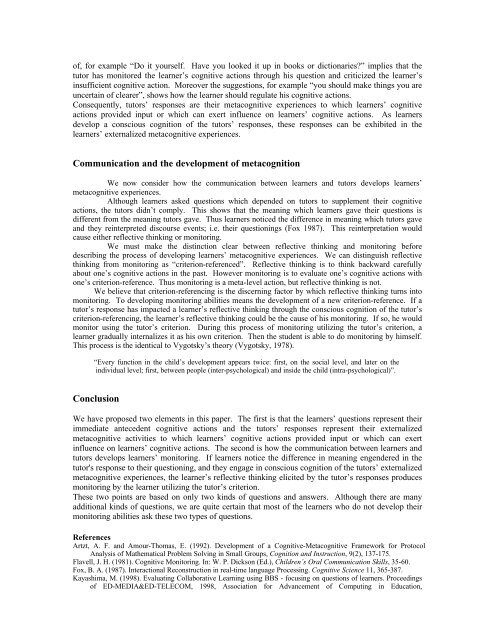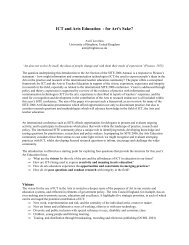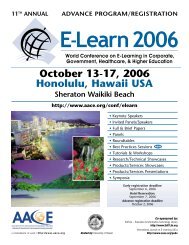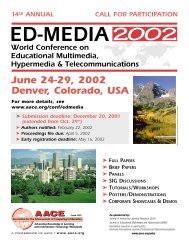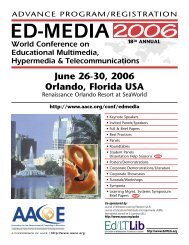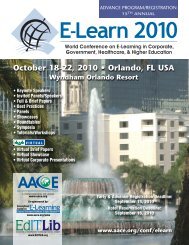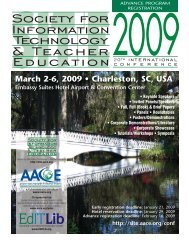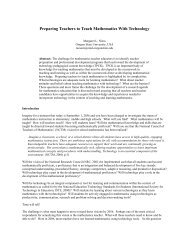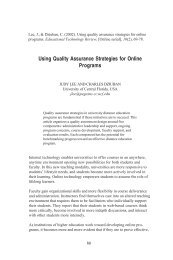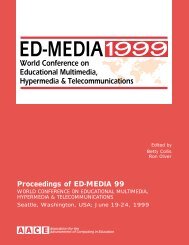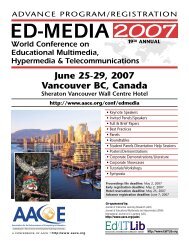ED-MEDIA 1999 Proceedings Book - Association for the ...
ED-MEDIA 1999 Proceedings Book - Association for the ...
ED-MEDIA 1999 Proceedings Book - Association for the ...
Create successful ePaper yourself
Turn your PDF publications into a flip-book with our unique Google optimized e-Paper software.
of, <strong>for</strong> example “Do it yourself. Have you looked it up in books or dictionaries” implies that <strong>the</strong><br />
tutor has monitored <strong>the</strong> learner’s cognitive actions through his question and criticized <strong>the</strong> learner’s<br />
insufficient cognitive action. Moreover <strong>the</strong> suggestions, <strong>for</strong> example “you should make things you are<br />
uncertain of clearer”, shows how <strong>the</strong> learner should regulate his cognitive actions.<br />
Consequently, tutors’ responses are <strong>the</strong>ir metacognitive experiences to which learners’ cognitive<br />
actions provided input or which can exert influence on learners’ cognitive actions. As learners<br />
develop a conscious cognition of <strong>the</strong> tutors’ responses, <strong>the</strong>se responses can be exhibited in <strong>the</strong><br />
learners’ externalized metacognitive experiences.<br />
Communication and <strong>the</strong> development of metacognition<br />
We now consider how <strong>the</strong> communication between learners and tutors develops learners’<br />
metacognitive experiences.<br />
Although learners asked questions which depended on tutors to supplement <strong>the</strong>ir cognitive<br />
actions, <strong>the</strong> tutors didn’t comply. This shows that <strong>the</strong> meaning which learners gave <strong>the</strong>ir questions is<br />
different from <strong>the</strong> meaning tutors gave. Thus learners noticed <strong>the</strong> difference in meaning which tutors gave<br />
and <strong>the</strong>y reinterpreted discourse events; i.e. <strong>the</strong>ir questionings (Fox 1987). This reinterpretation would<br />
cause ei<strong>the</strong>r reflective thinking or monitoring.<br />
We must make <strong>the</strong> distinction clear between reflective thinking and monitoring be<strong>for</strong>e<br />
describing <strong>the</strong> process of developing learners’ metacognitive experiences. We can distinguish reflective<br />
thinking from monitoring as “criterion-referenced”. Reflective thinking is to think backward carefully<br />
about one’s cognitive actions in <strong>the</strong> past. However monitoring is to evaluate one’s cognitive actions with<br />
one’s criterion-reference. Thus monitoring is a meta-level action, but reflective thinking is not.<br />
We believe that criterion-referencing is <strong>the</strong> discerning factor by which reflective thinking turns into<br />
monitoring. To developing monitoring abilities means <strong>the</strong> development of a new criterion-reference. If a<br />
tutor’s response has impacted a learner’s reflective thinking through <strong>the</strong> conscious cognition of <strong>the</strong> tutor’s<br />
criterion-referencing, <strong>the</strong> learner’s reflective thinking could be <strong>the</strong> cause of his monitoring. If so, he would<br />
monitor using <strong>the</strong> tutor’s criterion. During this process of monitoring utilizing <strong>the</strong> tutor’s criterion, a<br />
learner gradually internalizes it as his own criterion. Then <strong>the</strong> student is able to do monitoring by himself.<br />
This process is <strong>the</strong> identical to Vygotsky’s <strong>the</strong>ory (Vygotsky, 1978).<br />
“Every function in <strong>the</strong> child’s development appears twice: first, on <strong>the</strong> social level, and later on <strong>the</strong><br />
individual level; first, between people (inter-psychological) and inside <strong>the</strong> child (intra-psychological)”.<br />
Conclusion<br />
We have proposed two elements in this paper. The first is that <strong>the</strong> learners’ questions represent <strong>the</strong>ir<br />
immediate antecedent cognitive actions and <strong>the</strong> tutors’ responses represent <strong>the</strong>ir externalized<br />
metacognitive activities to which learners’ cognitive actions provided input or which can exert<br />
influence on learners’ cognitive actions. The second is how <strong>the</strong> communication between learners and<br />
tutors develops learners’ monitoring. If learners notice <strong>the</strong> difference in meaning engendered in <strong>the</strong><br />
tutor's response to <strong>the</strong>ir questioning, and <strong>the</strong>y engage in conscious cognition of <strong>the</strong> tutors’ externalized<br />
metacognitive experiences, <strong>the</strong> learner’s reflective thinking elicited by <strong>the</strong> tutor’s responses produces<br />
monitoring by <strong>the</strong> learner utilizing <strong>the</strong> tutor’s criterion.<br />
These two points are based on only two kinds of questions and answers. Although <strong>the</strong>re are many<br />
additional kinds of questions, we are quite certain that most of <strong>the</strong> learners who do not develop <strong>the</strong>ir<br />
monitoring abilities ask <strong>the</strong>se two types of questions.<br />
References<br />
Artzt, A. F. and Amour-Thomas, E. (1992). Development of a Cognitive-Metacognitive Framework <strong>for</strong> Protocol<br />
Analysis of Ma<strong>the</strong>matical Problem Solving in Small Groups, Cognition and Instruction, 9(2), 137-175.<br />
Flavell, J. H. (1981). Cognitive Monitoring. In: W. P. Dickson (Ed.), Children’s Oral Communication Skills, 35-60.<br />
Fox, B. A. (1987). Interactional Reconstruction in real-time language Processing. Cognitive Science 11, 365-387.<br />
Kayashima, M. (1998). Evaluating Collaborative Learning using BBS - focusing on questions of learners. <strong>Proceedings</strong><br />
of <strong>ED</strong>-M<strong>ED</strong>IA&<strong>ED</strong>-TELECOM, 1998, <strong>Association</strong> <strong>for</strong> Advancement of Computing in Education,


